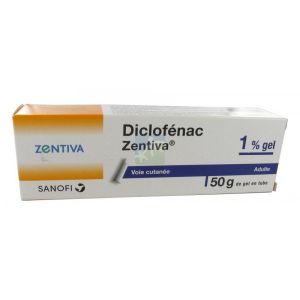Ship in Europe, Find out rates!
Diclofenac Zentiva 1% Anti-inflammatory Gel Pain 50 g

- box Delivery in Italy in 24/48 and free returns
- star3.000+ positive reviews
- dropboxOver 60,000 products in the catalog
Gel for topical use based on diclofenac sodium.
Therapeutic indications
Diclofenac Zentiva is a drug that is used in the local treatment of painful and inflammatory conditions of a rheumatic or traumatic nature of the joints, muscles, tendons and ligaments.
Dosage and posology
- Adults over 18 years : apply Diclofenac Zentiva 3 or 4 times a day on the area to be treated, rubbing lightly. The amount to be applied depends on the size of the affected part. After application, rinse your hands, otherwise they will also be treated with the gel. Warning: use only for short periods of treatment.
- Teenagers from 14 to 18 years : apply Diclofenac Zentiva 3 or 4 times a day on the area to be treated, rubbing lightly. The amount to be applied depends on the size of the affected part. After application, wash your hands, otherwise they will also be treated with the gel. If this product is needed for more than 7 days to relieve pain or if symptoms worsen, consult a doctor.
- Children below 14 years: insufficient data on efficacy and safety are available in children and adolescents below 14 years
- Elderly : The usual adult dosage may be used.
Overdose
The low systemic absorption of topical diclofenac makes an overdose very unlikely.
Contraindications
- Hypersensitivity to diclofenac or to any of the excipients
- Patients who have experienced asthma attacks, hives or acute rhinitis after taking acetylsalicylic acid or other non-steroidal anti-inflammatory drugs (NSAIDs)
- Third trimester of pregnancy
- Children and adolescents: Use in children and adolescents under the age of 14 is contraindicated
Side effects
The most common side effects that can occur are:
- Immune system disorders: very rare Hypersensitivity (including urticaria), angioneurotic edema.
- Infections and infestations: very rare Rash with pustules.
- Respiratory, thoracic and mediastinal disorders: Very rare Asthma.
- Skin and subcutaneous tissue disorders: Common Rash, eczema, erythema, dermatitis (including contact dermatitis), pruritus Rare Bullous dermatitis Very rare Photosensitivity reaction
Pregnancy and breastfeeding
- Pregnancy
The systemic concentration of diclofenac compared with oral formulations is lower after topical administration. Referring to experience with NSAID treatment for systemic administration, the following is recommended:
Inhibition of prostaglandin synthesis can adversely affect pregnancy and / or embryo / fetal development. Results of epidemiological studies suggest an increased risk of miscarriage and cardiac malformation and gastroschisis after use of a prostaglandin synthesis inhibitor in early pregnancy. The absolute risk of cardiac malformations increased from less than 1% to approximately 1.5%. The risk was considered to increase with dose and duration of therapy. In animals, administration of prostaglandin synthesis inhibitors has been shown to cause an increase in pre- and post-implantation loss and embryo-fetal mortality.
In addition, an increased incidence of various malformations, including cardiovascular, has been reported in animals given prostaglandin synthesis inhibitors during the organogenetic period. During the first and second trimester of pregnancy, diclofenac should not be administered except in strictly necessary cases. If diclofenac is used by a woman attempting to conceive, or during the first and second trimester of pregnancy, the dose should be kept as low as possible and the duration of treatment as short as possible.
During the third trimester of pregnancy, all prostaglandin synthesis inhibitors can expose the fetus to: cardiopulmonary toxicity (with premature closure of the arterial duct and pulmonary hypertension); renal dysfunction, which can progress to renal failure with oligo – hydroamnios; the mother and the newborn, at the end of pregnancy, to: possible prolongation of the bleeding time, and antiplatelet effect which can occur even at very low doses; inhibition of uterine contractions resulting in delayed or prolonged labor.
Consequently, diclofenac is contraindicated during the third trimester of pregnancy.
- Feeding time
Like other NSAIDs, diclofenac passes into breast milk in small amounts. However, no effects on the suckling child are anticipated at therapeutic doses of Diclofenac Zentiva. Due to the lack of controlled studies in breastfeeding women, the product should only be used during breastfeeding under the advice of a healthcare professional. In this circumstance, Diclofenac Zentiva should not be applied to the breasts of nursing mothers, or elsewhere on large areas of skin or for an extended period of time.
Special warnings
The possibility of systemic adverse events with the application of topical diclofenac cannot be excluded if the preparation is used on large skin areas and for a prolonged period (see summary of product characteristics of systemic forms of diclofenac).
Topical diclofenac should only be applied to intact, non-diseased skin, and not to skin wounds or open lesions. It should not be allowed to come into contact with eyes or mucous membranes and should not be ingested.
Discontinue treatment if skin rash develops after application of the product.
Topical diclofenac can be used with non-occlusive dressings, but should not be used with an occlusive dressing that does not allow air to pass.
Expiration and retention
Check the expiration date indicated on the package. The expiry date indicated on the package refers to the product in intact packaging, correctly stored. Store at a temperature not exceeding 25 ° C.
Warning : do not use the medicine after the expiry date indicated on the package.
Composition
Diclofenac Dorom Gel contains:
Active principle
Diclofenac sodium 1.00 g
Excipients
Purified water, 96% ethanol, isopropyl alcohol, carbomer, concentrated ammonia solution.

